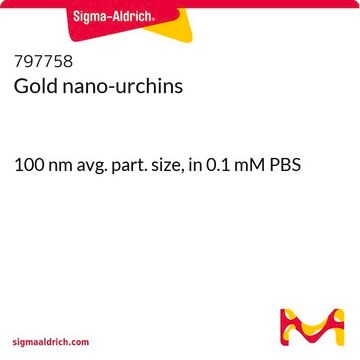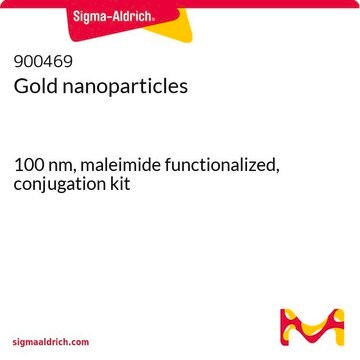753688
Gold nanoparticles
100 nm diameter, OD 1, stabilized suspension in 0.1 mM PBS, reactant free
Synonym(s):
Au NP, Gold colloid
About This Item
Recommended Products
form
nanoparticles
suspension
concentration
~3.8E+9 particles/mL
OD
1
diameter
100 nm
λmax
565-574 nm
storage temp.
2-8°C
SMILES string
[Au]
InChI
1S/Au
InChI key
PCHJSUWPFVWCPO-UHFFFAOYSA-N
Looking for similar products? Visit Product Comparison Guide
General description
Application
- As conductors in printable inks,
- In Photodynamic therapy,
- In drug delivery and biomarkers,,
- As calorimetric sensor,
- In biological imaging,
Legal Information
Storage Class Code
10 - Combustible liquids
WGK
nwg
Flash Point(F)
Not applicable
Flash Point(C)
Not applicable
Certificates of Analysis (COA)
Search for Certificates of Analysis (COA) by entering the products Lot/Batch Number. Lot and Batch Numbers can be found on a product’s label following the words ‘Lot’ or ‘Batch’.
Already Own This Product?
Find documentation for the products that you have recently purchased in the Document Library.
Customers Also Viewed
Articles
Steven J. Oldenburg, Ph.D. provides an overview of lateral flow diagnostic assays and discusses the use of ultra-bright reporter particles based on the unique optical properties of gold nanoshells that significantly increase the sensitivity of lateral flow immunoassays.
Sustainable energy sources with high production efficiency are crucial for meeting increasing energy demand.
Gold (Au) nanoparticles have tunable optical and electronic properties and are used in a number of applications including photovoltaics, sensors, drug delivery & catalysis.
Recent research highlights tunable properties of inorganic nanoparticles, driving interest in optoelectronics.
Our team of scientists has experience in all areas of research including Life Science, Material Science, Chemical Synthesis, Chromatography, Analytical and many others.
Contact Technical Service



